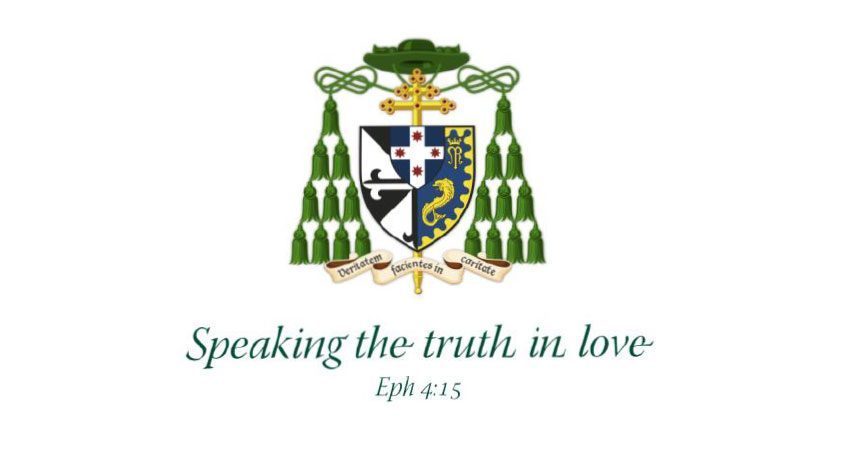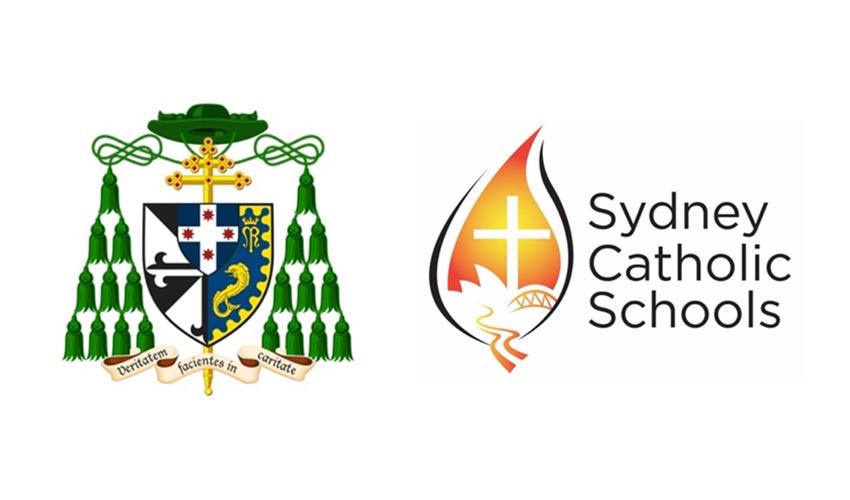HOMILY FOR MASS FOR OPENING OF THE 2021 SCHOOL YEAR + COMMISSIONING OF NEW TEACHERS FOR SYDNEY CATHOLIC SCHOOLS

St. Mary’s Cathedral, Sydney
In 1820, after waiting 32 years, the Catholics of the colony of New South Wales were finally given two official chaplains, and at last assured of regular sacraments, pastoral leadership and transmission of the faith to a new generation. One of Fr John Joseph Therry’s first acts was to seek land and funds to build here the first church of St Mary, ultimately Sydney’s cathedral and Australia’s mother church. Another was to establish a school in Parramatta. It opened with 31 pupils and its first full school year was 1821. Till then, no school operated by lay Catholics had survived, but schools sanctioned by the Church hierarchy would have greater longevity. Today both St Patrick’s Primary School and Parramatta Marist College claim descent from that school.
In the subsequent two hundred years the Catholic Church’s contribution to education in Australia grew enormously. Tens of thousands of pre-schoolers are now served by Church-sponsored early learning centres. 6,000 catechists offer religious education to 200,000 Catholic children in government schools. Around 50,000 tertiary students are enrolled in Catholic universities or other tertiary institutions. There are also 16 Catholic residential colleges and many chaplaincies in state universities. But the most remarkable achievement has been in primary and secondary education, where more than 1,750 Catholic schools, staffed by nearly 100,000 staff, now cater for more than 770,000 pupils.
From humble beginnings two centuries ago, the Church today engages in education almost from womb to tomb for more than a million students. For that we have priests, brothers and nuns (including St Mary MacKillop), parishioners and families to thank. Quality lay people now lead and staff those schools. So, our beginning teachers are joining an extraordinary tradition, older than any state school system in Australia, and they will forever be our “bicentennial beginners”.
Catholic schools are a jewel in the crown of the Catholic Church in Australia, with few parallels overseas. Alongside families and parishes, they are the Church’s principal meeting point with young people. For two centuries they have sought to educate the whole child – intellectually, physically, emotionally and spiritually. They’ve offered religious education and formation, and given glory to God in prayer and worship. Ask ordinary Aussies what the Catholic Church does in Australia and many immediately answer ‘they run schools’. Even many non-Catholic families entrust their children to us.
This makes Catholic schools not only a major work of the Church but also a big part of the nation’s educational ecosystem, aspiring to equal or better others in educational programs, student achievement, teacher professionalism, facilities and innovation. Governments, Church and families all contribute to resourcing this effort. Committed to excellence and equity, our schools have helped nurture a more just, tolerant and cohesive society.
As part of our bicentennial celebrations we launch this Thursday 200 Years Young: A Pastoral Letter from the Bishops of Australia to the Leaders, Staff, Students and Families of Catholic Education. I commend it to your reflection and discussion. It may occasion for some of you a deeper consideration of the place of faith and practice, not just in your work-life but your personal life.
In today’s Gospel Jesus’ frustration with His class is palpable as He asks: Do you still not get it? Are you brain dead or just closed-minded? Can’t you see or hear? (Mk 8:14-21) So, rather than high-falutin theology, He tries storytelling. Like St Patrick using a shamrock to teach about the Trinity, or St John Henry Newman using a three-stumped cricket wicket, the parable makes Christ’s message more relatable for His audience, whether educated or not.
Another advantage of stories is that they can speak to diverse audiences by showing something rather than reducing it to propositions. If you want to learn how to drive, better to get someone to show you how than try to pick it up from a manual. Christ’s parables are like that: they don’t explain things so much as disclose them. Jesus, you might say, was more a teacher-story-teller than an academic theologian or liturgical preacher.
Today He alludes to yeast (Mk 8:14-21; cf. Mt 16:5-12). In Judaism there was good yeast and bad, like good and bad cholesterol. Sometimes it was required,[i] at other times banned[ii] from cooking, sacrifices or surroundings. Passover was, of course, a feast of unleavened bread (Ex 13:3-10).
Jesus likewise uses the metaphor of yeast in a positive way when He compares the kingdom of God to a woman kneading yeast into dough so it will expand (Mt 13:33; Lk 13:20-1; cf. Gal 5:9): like leaven, faith can infect and enlarge hearts and the faithful can influence whole communities. But as our pandemic highlights, not all infections are so good, and Jesus uses the analogy of yeast to show how evil starts small but ends up contaminating all around it (Mt 16:6-12; Lk 12:1-3; cf. 1 Cor 5:6-8). Today He warns against the yeast of Herod and the Pharisees.
Though his numbskull disciples miss the point, the message is simple; as any teacher will tell you, if you allow a student to persevere in wrongdoing without consequences, he only get worse and end up affecting those around him. Before you know it, you have a ‘troubled’ class. The same is true, Our Lord suggests, of all our choices. Even the little things we do can multiply or fester, and even lone individuals or small communities influence a whole society, for good or ill.
Which brings me back to our bicentennial beginners. Every Christian must apply the leaven of life-giving Christ not death-dealing Herod to the dough of genuine disciples not resistant Pharisees. That means being in the Catholic education game not for what it can do for you but for what you can do for it; not to maintain the system but to enable young people to flourish; not to be spiritually indolent but rather passionate ‘missionary disciples’.
Every Christian, Pope Francis keeps insisting, “is challenged, here and now, to be actively engaged in evangelization.”[iii] Only last month he recalled that in the Acts of the Apostles Christians faced hardships much graver than our pandemic, yet by their preaching and teaching managed to spread “the fragrance of the Gospel” and “the joy of the Spirit”. We must be so passionate about our mission that, like them, we say to those who try to shut us up “We cannot but speak about what we have seen and heard.”[iv] Catholic schools, the Holy Father thinks, are a most valuable resource for evangelizing not just of individual children or their families, but whole cultures.[v] “To help boys and girls, young men and women, to know and love the Lord ever more deeply is one of the most beautiful educational adventures,” he told an international catechetics conference.[vi] As leaders and staff of our Catholic schools, you have the opportunity to knead the yeast of faith, hope and love into the dough of our future generations. Of course that requires that you cultivate it first in yourselves. Then, dear bicentennial beginners, you can be leaven for the whole lump of school, Church and society. Embrace that mission with passion and commitment and you will lead us into a third century of the great adventure of Catholic education.

INTRODUCTION TO MASS FOR OPENING OF THE 2021 SCHOOL YEAR + COMMISSIONING OF NEW TEACHERS FOR SYDNEY CATHOLIC SCHOOLS
St. Mary’s Cathedral
Welcome to our Mass marking the opening of a new school year for our Sydney Catholic Schools. Last year’s regional Masses were just about the last big gatherings allowed as the dark clouds of COVID-19 gathered. In the extraordinary year that followed our Catholic schools, staff, students and families really shone in very difficult circumstances. As we hope to turn a new leaf, we are aware that South of the border schools are closed again and that we are still vulnerable. So today we ask God to protect us and our colleagues in 2021 and especially our newest leaders, teachers, staff and students.
I acknowledge the presence of the Episcopal Vicar for Education, Very Rev. Michael McLean, and concelebrating clergy; Executive Director Tony Farley and other SCS senior management and staff; all our school leaders, teachers and general staff. A particular welcome to our beginning teachers who will be inducted through our special rite. You are joining our wonderful Sydney Catholic Schools system of 152 schools, more than 7,000 teachers and staff and nearly 72,000 students. My apologies that these strange times preclude my shaking all your hands – who knows if we will ever get back to that – but please know that I want to! To prepare ourselves for today’s celebration let us first repent of our sins…
[1] Lev 7:13; 23:17; Amos 4:5.
[2] e.g. Ex 12:15-20,34,39; 13:7; 23:18; 34:25; Lev 2:11; 6:17; Dt 16:3-4; Hos 7:4.
[3] Pope Francis, Evangelii Gaudium: Apostolic Exhortation on the Proclamation of the Gospel in Today’s World (2013),119-121; cf. many of his homilies and addresses.
[4] Pope Francis, Message for World Mission Day 2021, 6 January 2021, citing Acts 4:20.
[5] EG 134.
[6] Pope Francis, Address to International Catechetical Congress, 27 September 2013.

